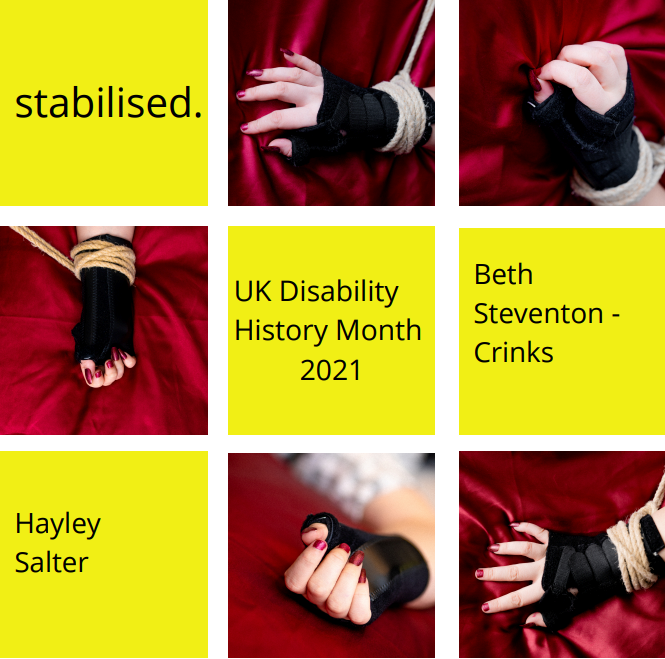stabilised.
Contribution by DaDa x NSDF company-member, Beth Steventon-Crinks, for Internationl Day of Disabled People 2021
stabilised. is a five-part photography series curated and modelled by Beth Steventon-Crinks and photographed by Hayley Salter. It is inspired by one of UK Disability History Month 2021 themes, Relationships + Sex. Read an accompanying blog by Beth on the subject here.
Image description as audio and text below.

Audiodescription:
Image description (text):
9 squares, in rows of 3, on a white background.
The first square, top left, is yellow and has the word ‘stabilised.’
Working across, the second square features a hand in a wrist splint, facing palm down. The background is a dark shade of pink, with the finger nails being a similar shade. Around the wrist is a hemp rope in a single column tie knot.
The 3rd square has the hand grabbing the material, with rope leading to the bottom right comer.
The 4th square (now on the second row) is the same object (hand), in this square the hand is facing up and the fingers are curled. The rope is leading over to the left.
The 5th square is the same yellow as the first and says ‘UK Disability History Month 2021’.
The 6th square is also yellow and says ‘Bethany Steventon-Crinks’.
The 7th square is yellow and says ‘Haley Salter’.
The 8th square has the wrist facing upwards. The model’s shirt can be seen in the distance but is out of focus, compared to the fingers that are in focus highlighting that the index and middle fingernails are notably shorter than the others. There is no rope in this image
The 9th Square has the hand flat, applying pressure to the material so it crinkles. The rope is going off to the top right corner of the square.
Bethany Steventon-Crinks is a Queer Disabled theatre maker, facilitator, qualified youth worker and graduate from the BA (Hons) Applied Performance course at the Royal Birmingham Conservatoire. Originally from the North West, Beth spends their time between Warrington and Birmingham. Their work, like their life, focuses on using neurodivergence and queer-ness as a lens to look at the world. stabilised. contrasts this, where the viewer is asked to look into the (both camera and neuro-queer) lens, rather than through it. Twitter: @SteventonCrinks Instagram: @Betterthanbeth
Hayley Salter is a West Midlands-based photographer, originally from Birmingham. She works in portraits, events and community arts alongside her personal work, and recently took part in an artist residency with Grain Photography Hub. Having graduated in 2019 from Goldsmiths University, London, she is interested in value-led projects that have a positive social or creative impact. Twitter: @hayleycsalter Instagram: @hayleycsalter